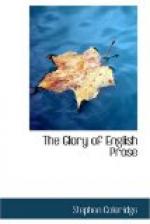The first edition of FitzGerald’s Omar Khayyam, issued at one shilling, was totally unrecognised, and copies of it might have been bought for twopence in the trays and boxes of trash on the pavement outside old bookshops!
But if once a work is published, time will with almost irresistible force place it ultimately in the station it deserves in the literature of the world.
Instant acceptance not seldom preludes final rejection. In the middle of the last century Martin Tupper’s Proverbial Philosophy garnished every drawing-room table; and now, where is it?
Your loving old
G.P.
P.S.—Do not look for the passage on Marie Antoinette in the French Revolution, for you will not find it there, but in the “Essay of the Diamond Necklace.”
24
MY DEAR ANTONY,
You and I once had a cousin, Henry Nelson Coleridge, who, had he lived, would very certainly have left a brilliant addition to the lustre of the name he bore. He was born in 1798, and only lived forty-five years, dying when his powers were leading him to high fortune in that legal profession which so many of the family have pursued.
He was a scholar of Eton; a Fellow of King’s College, Cambridge; he won the Greek and Latin Odes in 1820, and the Greek Ode again in 1821. To him, therefore, the classic spirit was inborn, and a training that omitted the study of Latin and Greek the very negation of education. He would have had something very trenchant to say of what is now known as “the modern side.” He wrote a very rich and splendid prose, and it is no fond family partiality that leads me to quote to you his eloquent and precious defence of the classical languages:—
“I am not one whose lot it has been to grow old in literary retirement, devoted to classical studies with an exclusiveness which might lead to an overweening estimate of these two noble languages. Few, I will not say evil, were the days allowed to me for such pursuits; and I was constrained, still young and an unripe scholar to forego them for the duties of an active and laborious profession. They are now amusements only, however delightful and improving. For I am far from assuming to understand all their riches, all their beauty, or all their power; yet I can profoundly feel their immeasurable superiority in many important respects to all we call modern; and I would fain think that there are many even among my younger readers who can now, or will hereafter, sympathise with the expression of my ardent admiration.
“Greek—the shrine of the genius of the old world; as universal as our race, as individual as ourselves; of infinite flexibility, or indefatigable strength, with the complication and the distinctness of Nature herself; to which nothing was vulgar, from which nothing was excluded; speaking to the ear like Italian, speaking to the




